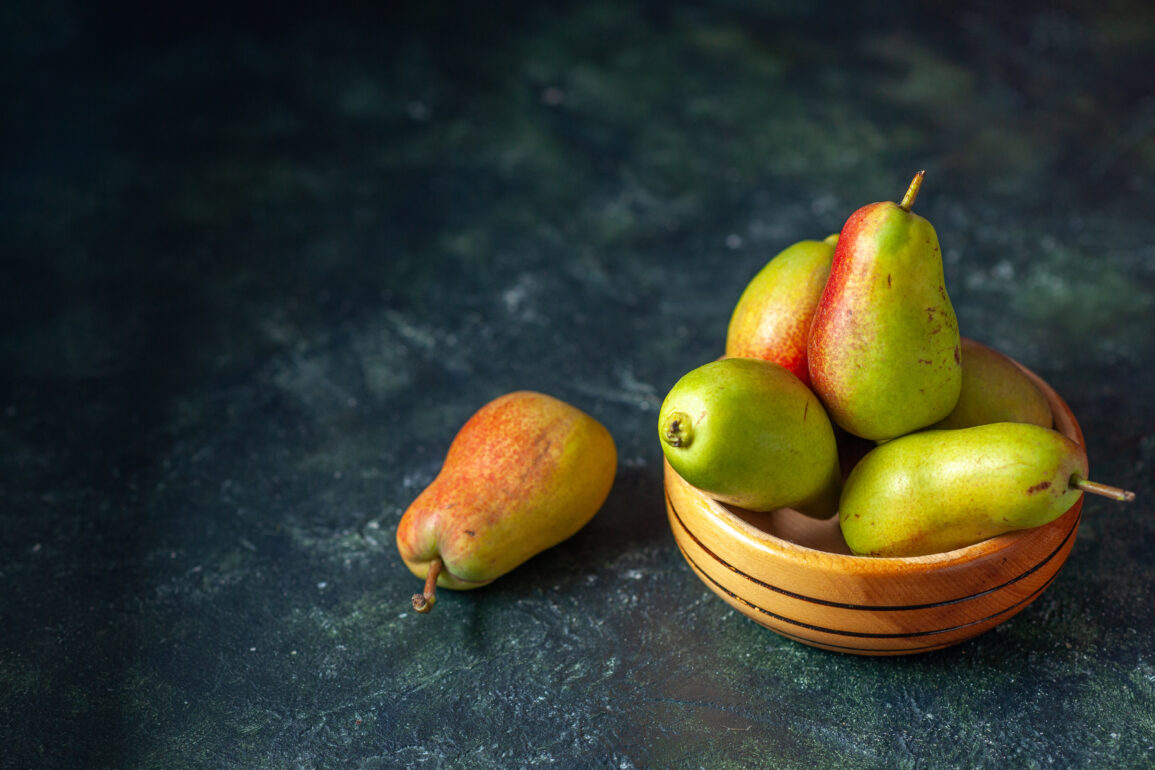Pears are one of the most versatile and delicious fruits available all year round. They are not only easy to find and affordable but also full of essential nutrients that support overall health. Whether you’re enjoying them as a quick snack, adding them to a smoothie, or baking them into desserts, pears offer a wealth of benefits. This article delves deep into the nutritional profile of pears and how they can contribute to improving various aspects of your health.

Nutritional Value of Pears (Per 100g)
Before we get into the health benefits of pears, let’s take a look at their nutritional value. Below is a table showing the primary nutrients found in 100 grams of pear:
| Nutrient | Amount |
|---|---|
| Calories | 57 kcal |
| Carbohydrates | 15.2g |
| Dietary Fiber | 3.1g |
| Sugars | 9.8g |
| Protein | 0.4g |
| Fat | 0.1g |
| Vitamin C | 7% of RDI |
| Vitamin K | 6% of RDI |
| Potassium | 2% of RDI |
| Copper | 4% of RDI |
As you can see, pears are low in calories and fats but rich in fiber, vitamins, and minerals, making them a fantastic option for health-conscious individuals.
1. Pears Are Rich in Dietary Fiber
One of the most significant health benefits of pears is their high dietary fiber content. Fiber is an essential component of a healthy diet because it helps in regulating digestion and preventing digestive problems such as constipation. Regular consumption of fiber helps maintain gut health, which plays a vital role in overall well-being.
There are two types of fiber: soluble and insoluble. Pears contain both, making them effective at improving digestive health. Soluble fiber helps to soften the stool and make it easier to pass, while insoluble fiber adds bulk to the stool, further aiding in the prevention of constipation.
Beyond just supporting digestive health, fiber also contributes to lowering cholesterol levels and reducing the risk of heart disease. In fact, studies have shown that diets high in fiber are associated with a reduced risk of cardiovascular disease and improved heart health.
Benefits of Fiber in Pears:
- Regulates bowel movements
- Prevents constipation
- Promotes gut health
- Lowers cholesterol
- Reduces the risk of heart disease
2. Pears Are Good for Your Heart
Heart disease remains one of the leading causes of death worldwide. Incorporating pears into your diet can help protect your heart and reduce the risk of cardiovascular problems. The fiber found in pears helps lower LDL (bad) cholesterol levels by binding to bile acids in the digestive tract and removing them from the body.
Additionally, pears are rich in antioxidants such as quercetin, which plays a role in reducing inflammation, a key factor in heart disease. Antioxidants help neutralize harmful free radicals that can damage cells and tissues, including those in the cardiovascular system. The potassium content in pears also supports heart health by regulating blood pressure and maintaining fluid balance in the body.
Regularly eating pears can lead to improved heart function, better circulation, and lower blood pressure, making them a heart-friendly fruit.
Heart-Health Benefits:
- Lowers cholesterol
- Reduces inflammation
- Regulates blood pressure
- Improves circulation
- Reduces the risk of heart disease
3. Pears Boost Your Immune System
Another excellent benefit of pears is their ability to boost the immune system. Pears are an excellent source of vitamin C, which is crucial for supporting immune function. Vitamin C acts as an antioxidant, helping to protect the body’s cells from damage caused by free radicals and environmental toxins. It also stimulates the production of white blood cells, which play a critical role in fighting off infections and illnesses.
Consuming pears regularly can help your body fight off common colds, flu, and other infections. Vitamin C also helps speed up the healing process, making pears a great addition to your diet when you’re feeling under the weather.
Immune-Boosting Benefits:
- Supports immune function
- Fights off infections
- Protects cells from free radical damage
- Aids in faster healing
4. Pears Aid in Weight Management
Pears are an excellent fruit for those looking to manage their weight or lose a few extra pounds. Since pears are low in calories and high in fiber, they help you feel fuller for longer, reducing the urge to overeat or snack between meals. The fiber in pears slows down digestion, which helps regulate appetite and prevent unnecessary calorie intake.
Incorporating pears into a balanced diet can be a practical approach to maintaining a healthy weight without feeling deprived. The natural sweetness of pears also makes them a great alternative to sugary snacks and desserts, helping to curb sugar cravings while providing essential nutrients.
Weight Management Benefits:
- Low in calories
- High in fiber for satiety
- Reduces overeating
- Curbs sugar cravings
5. Pears Improve Bone Health
Pears contain essential nutrients like vitamin K and copper, both of which are important for maintaining healthy bones. Vitamin K plays a crucial role in bone metabolism and helps in the regulation of calcium, a mineral necessary for bone strength. Deficiency in vitamin K has been linked to an increased risk of fractures and osteoporosis, particularly in older adults.
Copper, on the other hand, supports the formation of collagen, a protein that gives structure to bones, skin, and connective tissues. By consuming pears regularly, you can help maintain strong bones and reduce the risk of bone-related issues as you age.
Bone Health Benefits:
- Rich in vitamin K and copper
- Supports bone strength
- Reduces the risk of osteoporosis
- Promotes collagen formation
6. Pears Help Regulate Blood Sugar Levels
Despite their natural sweetness, pears have a low glycemic index (GI), which means they have a minimal impact on blood sugar levels. This makes them a suitable fruit for people with diabetes or those looking to manage their blood sugar levels. The fiber in pears slows down the absorption of sugars into the bloodstream, helping to prevent blood sugar spikes.
Pears also contain antioxidants and flavonoids that may improve insulin sensitivity, further helping to regulate blood sugar levels. Including pears in a balanced diet can contribute to better blood sugar control and reduce the risk of developing type 2 diabetes.
Blood Sugar Regulation Benefits:
- Low glycemic index
- Slows sugar absorption
- Improves insulin sensitivity
- Suitable for people with diabetes
7. Pears Promote Healthy Skin
Your skin reflects the health of your body, and pears can play a significant role in maintaining glowing, youthful skin. The vitamin C content in pears promotes collagen production, which is essential for maintaining skin elasticity and preventing the formation of wrinkles. Vitamin C also protects the skin from damage caused by harmful UV rays and environmental pollutants.
Pears are also rich in antioxidants that fight oxidative stress, which can lead to premature aging and skin damage. By consuming pears regularly, you can enjoy smoother, more radiant skin and reduce the appearance of fine lines and wrinkles.
Skin Health Benefits:
- Promotes collagen production
- Reduces wrinkles and fine lines
- Protects against UV damage
- Fights oxidative stress for youthful skin
8. Pears Support Digestive Health
Pears are known for their ability to promote healthy digestion. The high fiber content in pears not only helps prevent constipation but also supports the growth of healthy gut bacteria. A balanced gut microbiome is essential for good digestion, improved nutrient absorption, and a stronger immune system.
The water content in pears also helps keep the digestive tract hydrated, further aiding in smooth bowel movements. If you’re struggling with digestive issues or looking to improve gut health, adding pears to your diet is a simple and effective solution.
Digestive Health Benefits:
- Prevents constipation
- Promotes healthy gut bacteria
- Improves nutrient absorption
- Hydrates the digestive tract
9. Pears Keep You Hydrated
Hydration is crucial for maintaining overall health, and pears can help you stay hydrated due to their high water content. Proper hydration is essential for maintaining energy levels, supporting kidney function, and promoting healthy skin.
Eating water-rich fruits like pears is an easy and tasty way to stay hydrated throughout the day, especially during hot weather or after exercise.
Hydration Benefits:
- High water content
- Supports kidney function
- Promotes healthy skin
- Helps maintain energy levels
10. Pears May Reduce the Risk of Certain Cancers
Pears are rich in antioxidants and flavonoids that help protect cells from oxidative stress, which can lead to cancer. The fiber content in pears also plays a role in reducing the risk of colorectal cancer by promoting regular bowel movements and helping remove toxins from the body. Several studies suggest that consuming fiber-rich fruits, like pears, may reduce the risk of breast and colon cancers.
Cancer Prevention Benefits:
- Contains cancer-fighting antioxidants
- Reduces the risk of colon and breast cancer
- Supports toxin elimination from the body
11. Pears Support Eye Health
Pears are a good source of vitamin A, lutein, and zeaxanthin, all of which are important for maintaining healthy vision. These compounds act as antioxidants that help protect the eyes from oxidative damage caused by UV rays and aging. Regular consumption of pears may reduce the risk of age-related macular degeneration (AMD) and cataracts, two common eye conditions that affect older adults.
Eye Health Benefits:
- Rich in vitamin A and antioxidants
- Protects against age-related macular degeneration
- Helps prevent cataracts
12. Pears Improve Circulation
Pears contain copper and iron, both of which are essential for red blood cell production. Adequate red blood cell levels are necessary for transporting oxygen to different parts of the body. Copper also plays a role in enhancing the absorption of iron, further supporting blood health. Improved circulation can boost energy levels, enhance brain function, and speed up recovery from injuries.
Circulation Benefits:
- Supports red blood cell production
- Improves oxygen delivery to tissues
- Boosts energy and recovery
13. Pears Help Fight Inflammation
Chronic inflammation is linked to various health issues, including heart disease, diabetes, and certain cancers. Pears are rich in antioxidants like quercetin and kaempferol, which have anti-inflammatory properties. Regular consumption of pears may help reduce inflammation in the body, contributing to lower risks of chronic diseases and better overall health.
Anti-Inflammatory Benefits:
- Reduces chronic inflammation
- Lowers the risk of inflammatory diseases
- Contains anti-inflammatory antioxidants
14. Pears May Support Brain Health
The antioxidants in pears also contribute to brain health by protecting brain cells from oxidative stress and inflammation. Pears contain copper, which is essential for maintaining cognitive function and preventing neurodegenerative diseases like Alzheimer’s. Studies suggest that a diet rich in fruits, including pears, may support memory, focus, and overall cognitive health.
Brain Health Benefits:
- Protects against oxidative stress
- May reduce the risk of Alzheimer’s disease
- Supports cognitive function and memory
How to Include Pears in Your Diet
Incorporating pears into your daily meals is easy, thanks to their versatility. Here are some ways to enjoy pears:
- Fresh Pears: Eat them on their own or slice them into your favorite salads.
- Smoothies: Add pears to your smoothies for natural sweetness and a nutritional boost.
- Baked Pears: Bake pears with cinnamon and honey for a healthy dessert.
- Pear Jam: Make pear jam for a sweet spread on toast or pancakes.
- Pear Salad: Combine pears with nuts, cheese, and leafy greens for a delicious and nutritious salad.
15. Pears Help Detoxify the Body
Pears are rich in water and fiber, which help flush toxins from the body. The natural diuretic properties of pears assist the kidneys in removing waste and excess fluids, reducing the risk of kidney stones and promoting better urinary tract health. Additionally, the fiber in pears binds to toxins in the colon and facilitates their removal through bowel movements, supporting a natural detox process.
Detoxification Benefits:
- Aids kidney function and detoxification
- Supports urinary tract health
- Removes toxins from the colon
16. Pears Support Respiratory Health
Pears contain essential nutrients and antioxidants that can help improve respiratory health. The anti-inflammatory compounds found in pears may ease conditions such as asthma and bronchitis by reducing inflammation in the airways. The high vitamin C content also strengthens the immune system, helping to protect against respiratory infections like the common cold or flu.
Respiratory Health Benefits:
- Reduces airway inflammation
- Eases asthma and bronchitis symptoms
- Supports immune system against respiratory infections
17. Pears Improve Gut Microbiome Balance
The fiber in pears is not only great for digestion but also feeds the beneficial bacteria in your gut. A healthy balance of gut bacteria is essential for immune function, mental health, and proper digestion. By acting as a prebiotic (food for probiotics), pears help cultivate a thriving gut microbiome, which may reduce the risk of digestive disorders, autoimmune conditions, and even mental health issues like depression.
Gut Health Benefits:
- Promotes healthy gut bacteria
- Acts as a prebiotic
- Reduces the risk of digestive and autoimmune disorders
18. Pears May Improve Fertility
For couples trying to conceive, pears can be a helpful addition to their diet. The fruit contains important nutrients like folate (vitamin B9), which is essential for reproductive health and proper fetal development. Adequate folate intake is especially important for women of childbearing age to reduce the risk of neural tube defects during pregnancy. Pears also contain antioxidants and vitamin C, which support reproductive health by reducing oxidative stress in the body.
Fertility Benefits:
- Rich in folate for reproductive health
- Supports proper fetal development
- Reduces oxidative stress linked to infertility
19. Pears Enhance Mental Clarity and Mood
Pears contain several nutrients that contribute to brain health, including copper and antioxidants. Copper plays a key role in neurotransmitter production, which helps regulate mood and mental clarity. Pears’ natural sugars, combined with their fiber content, provide a steady release of energy, preventing energy crashes and mood swings. The anti-inflammatory properties of pears may also protect against cognitive decline as you age.
Mental Clarity and Mood Benefits:
- Enhances mental focus and clarity
- Supports neurotransmitter function
- Helps prevent cognitive decline and mood swings
20. Pears Improve Skin Hydration
The high water content in pears helps keep your skin hydrated and glowing. Proper hydration is key to maintaining skin elasticity, reducing the appearance of fine lines, and preventing dryness. Additionally, pears are rich in vitamins A and C, both of which are crucial for skin repair and renewal. Eating pears regularly can help maintain a well-hydrated, youthful complexion.
Skin Hydration Benefits:
- Keeps skin hydrated and plump
- Reduces fine lines and wrinkles
- Supports skin repair and renewal
21. Pears Are Allergy-Friendly
Pears are often recommended as one of the least allergenic fruits, making them an excellent choice for people with food sensitivities or allergies. They are commonly included in hypoallergenic diets, especially for infants or those with compromised immune systems. Because pears are low in allergens, they are less likely to cause allergic reactions and can be safely consumed by a broader range of people.
Allergy-Friendly Benefits:
- Low risk of allergic reactions
- Suitable for hypoallergenic diets
- Safe for infants and people with food sensitivities
22. Pears May Aid in Preventing Anemia
Iron deficiency anemia is a common condition where the body lacks sufficient red blood cells due to inadequate iron intake. Pears, while not rich in iron, contain vitamin C, which enhances iron absorption from other iron-rich foods when consumed together. Pairing pears with foods like spinach, beans, or lean meats can improve your body’s ability to absorb iron and prevent anemia.
Anemia Prevention Benefits:
- Enhances iron absorption with vitamin C
- Supports red blood cell production
- Helps prevent iron deficiency anemia
23. Pears Help Reduce Inflammation in Joints
Pears are rich in antioxidants and anti-inflammatory compounds that can help reduce inflammation in joints, particularly for those suffering from arthritis. Chronic inflammation in the joints can lead to stiffness, pain, and reduced mobility. Pears, especially with their quercetin content, help fight inflammation and may ease symptoms of conditions like rheumatoid arthritis and osteoarthritis.
Joint Health Benefits:
- Reduces inflammation in joints
- Eases arthritis symptoms
- Improves joint mobility and flexibility
24. Pears Support Healthy Aging
Pears are loaded with antioxidants, which play a key role in neutralizing free radicals that can accelerate the aging process. These antioxidants help protect cells from damage, reduce inflammation, and improve skin elasticity, all of which are essential for aging gracefully. Regular consumption of pears can support cognitive function, reduce the risk of age-related diseases, and keep the skin looking youthful.
Healthy Aging Benefits:
- Protects cells from oxidative stress
- Supports cognitive function in older adults
- Reduces the risk of age-related diseases
Conclusion
Pears are a nutrient-rich fruit with a variety of health benefits. From promoting heart health and boosting immunity to aiding in digestion and weight management, pears offer a range of advantages for people of all ages. By incorporating pears into your daily diet, you can enjoy these benefits while savoring the delicious flavor of this versatile fruit.
Make pears a part of your daily routine and experience the numerous health benefits they offer!










